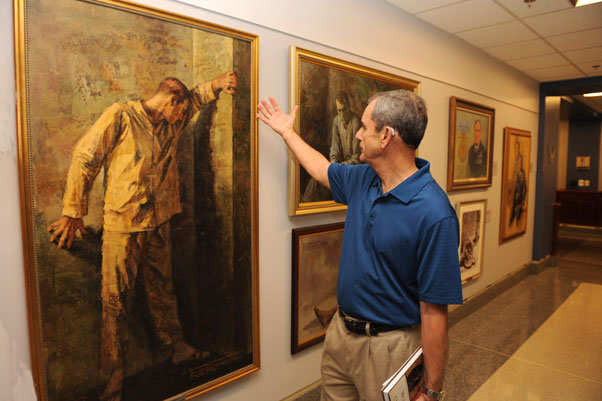WASHINGTON (AFNS) — Retired Col. Leon Ellis was a prisoner of war for 1,955 days during the Vietnam War. During a July 16 visit to the Pentagon, he and his family stopped by the Air Force POW tribute section. Ellis said some painful memories flooded back about his time as a POW as he viewed the paintings.
Maxine McCaffrey, a friend and artist, passed away in 1979. McCaffrey donated 60 works to the Air Force Art Program, and some of her paintings were reproduced in poster and post card form by POW organizations. Her paintings show realistic features and have brought worldwide attention to captives.
“Maxine McCaffrey portrayed the life of a POW so accurate without even seeing it,” Ellis said. “The painting of the man facing the cell wall with several names carved in symbolized isolation.”
Ellis’ worst nightmare became a reality after his plane was shot down and he was captured by the enemy and placed in the Hanoi Hilton prison camp. During his years of captivity and torture, he faced many challenges. In the end, he found courage — a courage which led him to his passion in life to be a leader-consultant and coach.
“I define courage as doing what’s right even when it doesn’t feel natural and doesn’t feel safe,” Ellis said. “Overcoming fears to do what we know is right – that’s leading with honor.”
Ellis said the camp was awful for everybody, especially those of higher rank, but the higher-ranking prisoners always led by example and never gave into the brutality.
“The leadership at the camp, the senior officers of each branch, was tortured more than the rest of us,” Ellis said. “But they always did the right thing, and, of course, we all followed.”
A year after returning home from the prison camp, he met a young lady named Mary, who he married seven months later. He said his POW experience made him feel like he had to be in control of everything, the safety of his family was the number one priority.
Their marriage went through tough times, like all marriages, but he said the couple believes their marriage has had fewer issues than most, due to counseling. Marriage counseling helped them, and also benefited Ellis in more ways than one. He faced signs of post-traumatic stress disorder, but was unaware of the disorder due to the lack of public knowledge about it at the time.
“When you are isolated from the world, you try to take control of everything you can in your life,” Ellis said.
Ellis has taken huge strides in reintegrating himself back into society. He is now the president of an organization that provides leadership resources and training in the areas of hiring, teambuilding, leadership, human performance development and succession planning. He is also the author of “Leading with Honor” and speaks at several conventions throughout the year.












